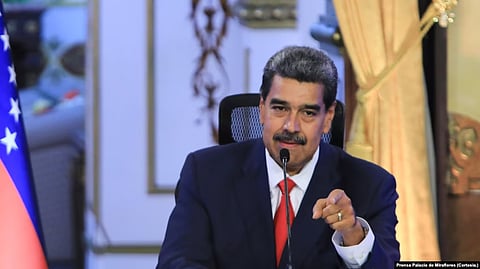
- Home
- न्यूजग्राम
- NewsGram USA
- India
- World
- Politics
- Entertainment
- Culture
- Lifestyle
- Economy
- Sports
- Sp. Coverage
- Misc.
- NewsGram Exclusive
- Jobs / Internships

The human rights situation in Venezuela significantly worsened in the last year, according to the recently released 2024 State Department Human Rights Report. In particular, after the July 2024, presidential election, Nicolás Maduro and his representatives engaged in serious human rights abuses, reaching “a new milestone in the degradation of the rule of law,” according to the UN Independent International Fact-Finding Mission on Venezuela.
Significant human rights abuses included credible reports of arbitrary or unlawful killings; disappearances; torture or cruel, inhuman, or degrading treatment; arbitrary arrest or detention; transnational repression against individuals in another country; unlawful recruitment or use of children by Maduro-supported groups in armed conflict; serious restrictions on freedom of expression and media freedom; trafficking in persons, including forced labor, among others.
No credible steps or actions were taken to identify and punish officials who committed human rights abuses.
The law provides for freedom of expression, but this freedom was significantly restricted due to laws governing libel, slander, and media content; legal harassment, physical intimidation of individuals and media outlets; and Maduro’s undue influence on the judiciary.
Pro-Maduro national and state leaders and other figures harassed and intimidated privately owned and democratic opposition-oriented television stations, media outlets, and journalists by using threats, property seizures, administrative and criminal investigations, and prosecutions.
The non-governmental organization Espacio Público registered 98 cases of abuses of freedom of expression in the months preceding the July 2024 presidential election, the most recorded since it began collecting data in 2009.
Prolonged pretrial detention remains a significant problem in Venezuela. Due to overcrowding in prisons, many police station offices were used as makeshift prison cells. Long delays in court proceedings and prison transfers caused some prisoners to be held in these facilities for years.
There were credible reports that Maduro-aligned security forces regularly tortured and abused detainees. In prisons, women were targeted for sexual violence, abuse, and torture and were frequently coerced into sexual acts in exchange for food or water.
For over a decade, Maduro has been a leader of Cartel de los Soles, which is responsible for trafficking drugs into the United States. On July 25, 2025, the U.S. Department of the Treasury designated Cartel de Los Soles as a Specially Designated Global Terrorist. The U.S. government is now offering a $50 million reward for information leading to Maduro’s arrest.
“The Maduro regime is not the legitimate government of Venezuela. It is a narco-terror cartel,” White House press secretary Karoline Leavitt said at a recent briefing. “Maduro is not a legitimate president; he is a fugitive from this drug cartel.”
(VOA/NS)
Also Read:
